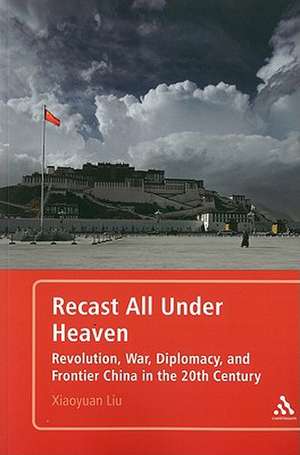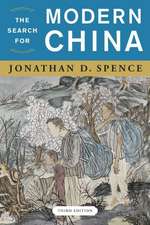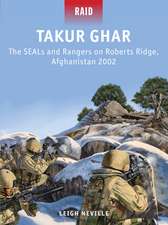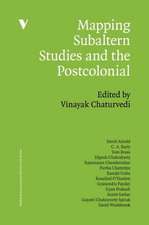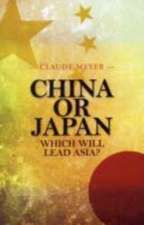Recast All under Heaven: Revolution, War, Diplomacy, and Frontier China in the 20th Century
Autor Professor of History Xiaoyuan Liuen Limba Engleză Paperback – 13 oct 2010
Preț: 258.89 lei
Preț vechi: 296.76 lei
-13% Nou
Puncte Express: 388
Preț estimativ în valută:
49.55€ • 53.85$ • 41.65£
49.55€ • 53.85$ • 41.65£
Carte tipărită la comandă
Livrare economică 21 aprilie-05 mai
Preluare comenzi: 021 569.72.76
Specificații
ISBN-13: 9781441134899
ISBN-10: 1441134891
Pagini: 288
Ilustrații: 10
Dimensiuni: 152 x 224 x 20 mm
Greutate: 0.43 kg
Editura: Bloomsbury Publishing
Colecția Continuum
Locul publicării:New York, United States
ISBN-10: 1441134891
Pagini: 288
Ilustrații: 10
Dimensiuni: 152 x 224 x 20 mm
Greutate: 0.43 kg
Editura: Bloomsbury Publishing
Colecția Continuum
Locul publicării:New York, United States
Caracteristici
By focusing on the fringes of Chinese nationality, Recast All under Heaven breaks new ground with a new paradigm for understanding for modern Chinese history.
Cuprins
Preface
List of Maps
Part I A Territorial Perception of Modern China
Chapter 1 Modern Transformation of Chinese Territoriality
Territoriality
Historical China
Sovereignty
Transformation
Chapter 2 China's Central Asian Identity
Chinese Nationalism
Frontier Nationalism
Failure of Containment
Part II Chinese Nationalist Experiences
Chapter 3 Resume China's Korean Connection
Illusive Greatness
Abortive Partnership
Elusive Contingencies
Chapter 4 Recast China's Role in Vietnam
"Big Brother"
Options
Drifting
Chapter 5 Reassert Chinese Authority in a Frontier
"Mongolian Question"
"International Conspiracy"
"Restoration"
Part III Chinese Communist Ethnopolitics
Chapter 6 "National Question" with Chinese Characteristics
Bolshevism in China
Revolutionary Independence
Interethnic Contact
Two Wings of Nationalism
Chapter 7 Solve Rubik's Cube in the Steppes
Bloc, National, and Ethnic Politics
National and Frontier Priorities
Autonomy as Rebellion
Chapter 8 Break the Vicious Circle along the Himalayas
Reverse a Verdict
Convert the Dalai Lama
Reform Tibet, or Not
"Let Them Go"
Part IV From World War to Cold War
Chapter 9 The United States and Frontier China
European and Asian "Minorities"
"Chinese Unification"
China's "Three Corners"
Politics of "Color" and "Shape"
Chapter 10 Mongolia between Beijing and Moscow
From Party to State
Old and New "Kitchen"
American Wedge
Mongolian Crack
Chapter 11 Cold and Hot Wars along the Himalayas
Second Cold War Front
Covert Operations
From Friends to Foes
From Comrades to Adversaries
Epilogue Search for a Frontier Theme
Bibliography
Index
List of Maps
Part I A Territorial Perception of Modern China
Chapter 1 Modern Transformation of Chinese Territoriality
Territoriality
Historical China
Sovereignty
Transformation
Chapter 2 China's Central Asian Identity
Chinese Nationalism
Frontier Nationalism
Failure of Containment
Part II Chinese Nationalist Experiences
Chapter 3 Resume China's Korean Connection
Illusive Greatness
Abortive Partnership
Elusive Contingencies
Chapter 4 Recast China's Role in Vietnam
"Big Brother"
Options
Drifting
Chapter 5 Reassert Chinese Authority in a Frontier
"Mongolian Question"
"International Conspiracy"
"Restoration"
Part III Chinese Communist Ethnopolitics
Chapter 6 "National Question" with Chinese Characteristics
Bolshevism in China
Revolutionary Independence
Interethnic Contact
Two Wings of Nationalism
Chapter 7 Solve Rubik's Cube in the Steppes
Bloc, National, and Ethnic Politics
National and Frontier Priorities
Autonomy as Rebellion
Chapter 8 Break the Vicious Circle along the Himalayas
Reverse a Verdict
Convert the Dalai Lama
Reform Tibet, or Not
"Let Them Go"
Part IV From World War to Cold War
Chapter 9 The United States and Frontier China
European and Asian "Minorities"
"Chinese Unification"
China's "Three Corners"
Politics of "Color" and "Shape"
Chapter 10 Mongolia between Beijing and Moscow
From Party to State
Old and New "Kitchen"
American Wedge
Mongolian Crack
Chapter 11 Cold and Hot Wars along the Himalayas
Second Cold War Front
Covert Operations
From Friends to Foes
From Comrades to Adversaries
Epilogue Search for a Frontier Theme
Bibliography
Index
Recenzii
"In this collection of well-argued essays, Professor Xiaoyuan Liu offers an extremely valuable perspective on the evolution of China's "geo-body" in the nineteenth and twentieth centuries--that is, its evolution from an empire to a "modern" nation state. This complex process involved a constant effort to reconcile the unifying impulses of the central government with the vibrant ethnic particularism that existed within China's constantly shifting borders."Richard J. Smith,George and Nancy Rupp Professor of Humanities and Professor of History, Rice University, USA
"The rise of China to the status of a global power necessitated its transformation from a loosely integrated empire into a modern state. This process entailed the assertion of central control over Tibet, Xinjiang, and Inner Mongolia, Inner Asian lands that had long been contested by foreign powers and nurtured their own aspirations for independence or genuine autonomy. In this illuminating set of essays, Liu Xiaoyuan, the master of China's frontier history and ethnopolitics, ranges widely across the boundaries of space and time to examine how modern China came into being. By emphasizing the seemingly paradoxical centrality of the periphery in the consolidation and legitimation of Chinese political authority, Liu explains Beijing's concern about trouble on its Inner Asian frontiers and expands our understanding of China's modern history." --Steven I. Levine, Senior Research Associate, Maureen and Mike Mansfield Center, The University of Montana
"Xiaoyuan Liu has provided a most compelling study of frontier in the shaping of modern China modern territorial identity. Ethnopolitics, usually confined to the domestic sphere, must now be "recast" and brought to the forefront of any attempt to understand China's international relations, and vice versa."--Uradyn E. Bulag, University of Cambridge
"The rise of China to the status of a global power necessitated its transformation from a loosely integrated empire into a modern state. This process entailed the assertion of central control over Tibet, Xinjiang, and Inner Mongolia, Inner Asian lands that had long been contested by foreign powers and nurtured their own aspirations for independence or genuine autonomy. In this illuminating set of essays, Liu Xiaoyuan, the master of China's frontier history and ethnopolitics, ranges widely across the boundaries of space and time to examine how modern China came into being. By emphasizing the seemingly paradoxical centrality of the periphery in the consolidation and legitimation of Chinese political authority, Liu explains Beijing's concern about trouble on its Inner Asian frontiers and expands our understanding of China's modern history." --Steven I. Levine, Senior Research Associate, Maureen and Mike Mansfield Center, The University of Montana
"Xiaoyuan Liu has provided a most compelling study of frontier in the shaping of modern China modern territorial identity. Ethnopolitics, usually confined to the domestic sphere, must now be "recast" and brought to the forefront of any attempt to understand China's international relations, and vice versa."--Uradyn E. Bulag, University of Cambridge
